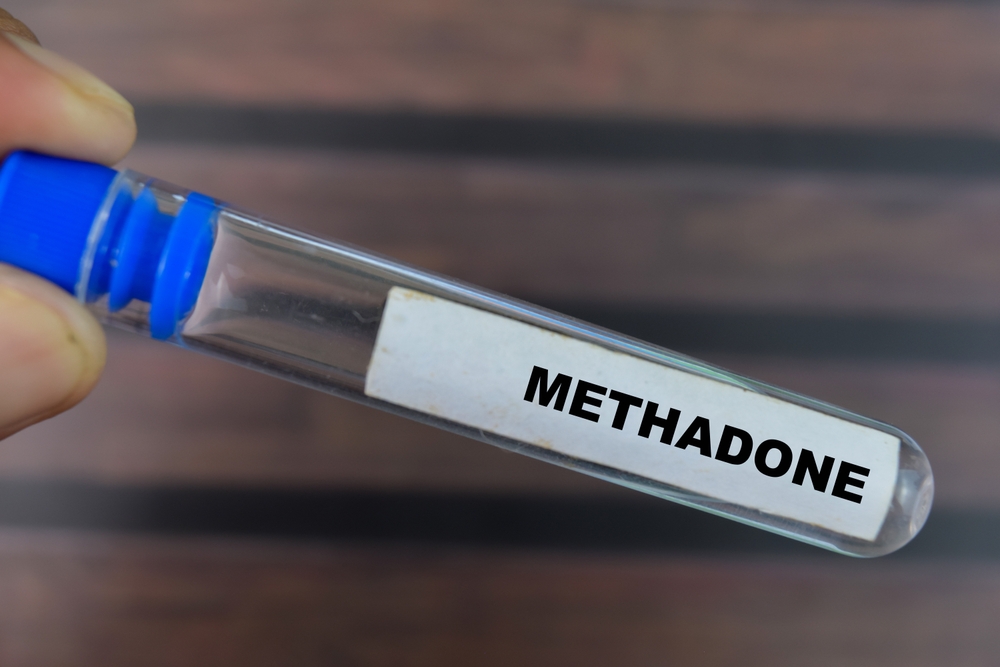Last Updated:
May 16th, 2025
Methadone Addiction | Symptoms, Effects and Causes
Methadone is a key medicine in the fight against heroin and opioid addiction. It works well because it can calm the body’s craving for opioids and ease withdrawal symptoms, which makes stopping drug use easier and safer. However, methadone can actually be addictive itself, leading to a cruel situation where you can find yourself dependent on the medication intended for your recovery. Anyone on methadone treatment needs to know about this risk, look out for methadone addiction signs and symptoms and ask for help if they need it.

What is methadone?
Like other opioids, methadone can be used as a painkiller, but it is best known and most commonly used in methadone maintenance treatment (MMT). If someone has been using opioids heavily and for a long time, their body begins to adjust to the drugs. Abruptly stopping opioids can lead to severe and even dangerous withdrawal symptoms because the body is shocked by their sudden absences.
Methadone is able to help with this because it acts on the same opioid receptors but without creating a high. Unlike the drugs it replaces, one dose of methadone per day is often enough to satisfy cravings. This dose can gradually be reduced to stop opioid use altogether eventually. This needs to be a very carefully planned process, and the time it takes varies for different people.
What is methadone addiction?
Methadone addiction happens when someone becomes reliant on the medicine, often when using it as an opioid replacement. It can feel like a tough twist of fate as what seemed like a beacon of hope becomes just another addictive trap.
Methadone addiction can develop in much the same way as other dependencies with some people using methadone in doses higher than recommended or more often than their treatment plan allows. This misuse can make their bodies demand methadone to get through the day without experiencing new and often painful withdrawal symptoms.
Alongside physical dependence, methadone addiction can deeply entangle itself in the psychological fabric of a person’s life. Many turn to methadone not just for physical relief but as a mental crutch to handle life’s stresses, pains or, very often, the fear of relapsing with the original drug.
The warning signs of methadone addiction
It is very important that anyone undergoing MMT is aware of the signs of methadone addiction. Spotting these methadone addiction symptoms early can help to address the situation before it spirals:
- Finding that the methadone dose you used to take just isn’t enough anymore.
- Having cravings for methadone that feel just like those you had for other drugs.
- Being completely distracted by getting more methadone or worrying that you won’t be able to.
- Not being interested in anything other than using methadone with your relationships, work and friendships all suffering.
- Feeling sick, shaky or anxious when you try to stop taking methadone (common signs of withdrawal).
- Continuing to take methadone even though these problems are clear and obvious.
Recognising these methadone addiction signs can feel like you are going in circles, moving from one addiction to another. But try not to feel too frustrated. They may indicate that you need to adjust your treatment plan or that some extra work is needed on the root causes of your struggles.
What causes methadone addiction?
Methadone addiction is a complex condition with various underlying causes. What pushes one person to addiction may not be the same for someone else, but some of the most common causes include:
The mental and physical dangers of methadone addiction
Methadone addiction can turn life into a tough and overwhelming struggle, affecting your physical health and mental well-being and even causing a tragic relapse. Here is a closer look at the risks:
How to overcome methadone addiction
Overcoming methadone addiction presents unique challenges, largely because of the drug’s long half-life, meaning it stays in the body for an extended period. Methadone symptoms can be severe and enduring, but a carefully structured and managed treatment plan can ensure safety and effectiveness.
The process starts with methadone detox, where your doctors carefully guide you through reducing your methadone use. This slow, supervised approach helps your body adjust without going into the shock of withdrawal. Sometimes, a safer medication like buprenorphine is used to make the transition smoother and more manageable.
Once your body is no longer dependent on methadone, the focus shifts to acquiring a deeper understanding of the emotional and mental roots of methadone addiction. This is where methadone rehab comes in with therapy that addresses these root causes. Methadone rehab will help you understand what went wrong and how to give yourself the best chances of recovery this time.
There are various rehab options in the UK, including private centres and free NHS services, so it is important to explore what’s available so you can make an informed choice.

How to get help for methadone addiction
Battling methadone addiction can feel overwhelming but Addiction Helper can help you find the perfect support network and treatment programme that meets your unique recovery needs. Contact us today, and our team will help you find the perfect treatment programme and take the first steps toward a whole new life.
Our compassionate team are ready and available to take your call, and guide you towards lasting the lasting addiction recovery you deserve.
Frequently Asked Questions
(Click here to see works cited)
- UK-Rehab. “Opiates – Addiction To Methadone Information | UK Rehab.” UK-Rehab, https://www.uk-rehab.com/opiate-addiction/methadone/. Accessed 16 January 2025.
- SAMHSA. “What is Methadone?” SAMHSA, 28 March 2024, https://www.samhsa.gov/medications-substance-use-disorders/medications-counseling-related-conditions/methadone. Accessed 16 January 2025.
- NCBI. “Methadone maintenance treatment – Clinical Guidelines for Withdrawal Management and Treatment of Drug Dependence in Closed Settings.” NCBI, https://www.ncbi.nlm.nih.gov/books/NBK310658/. Accessed 16 January 2025.
- Durrani, Mehnoor, and Kamna Bansal. “Methadone – StatPearls.” NCBI, 11 January 2024, https://www.ncbi.nlm.nih.gov/books/NBK562216/. Accessed 16 January 2025.
- NHS. “Methadone – medicine used to treat heroin dependence.” NHS, https://www.nhs.uk/medicines/methadone/. Accessed 16 January 2025.

